The AMD Ryzen 5 1600X vs Core i5 Review: Twelve Threads vs Four at $250
by Ian Cutress on April 11, 2017 9:00 AM ESTBenchmarking Performance: CPU Web Tests
One of the issues when running web-based tests is the nature of modern browsers to automatically install updates. This means any sustained period of benchmarking will invariably fall foul of the 'it's updated beyond the state of comparison' rule, especially when browsers will update if you give them half a second to think about it. Despite this, we were able to find a series of commands to create an un-updatable version of Chrome 56 for our 2017 test suite. While this means we might not be on the bleeding edge of the latest browser, it makes the scores between CPUs comparable.
SunSpider 1.0.2 [link]
The oldest web-based benchmark in this portion of our test is SunSpider. This is a very basic javascript algorithm tool, and ends up being more a measure of IPC and latency than anything else, with most high performance CPUs scoring around about the same. The basic test is looped 10 times and the average taken. We run the basic test 4 times.
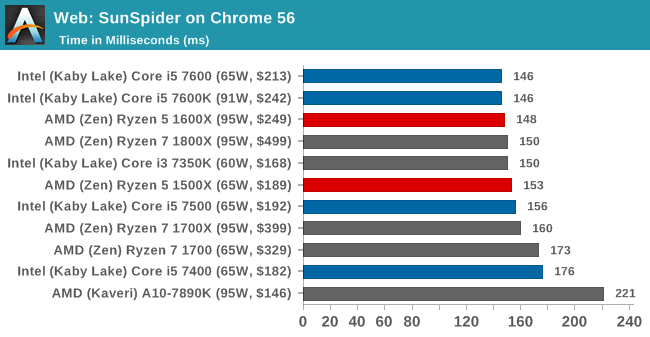
Mozilla Kraken 1.1 [link]
Kraken is another Javascript based benchmark, using the same test harness as SunSpider, but focusing on more stringent real-world use cases and libraries, such as audio processing and image filters. Again, the basic test is looped ten times, and we run the basic test four times.
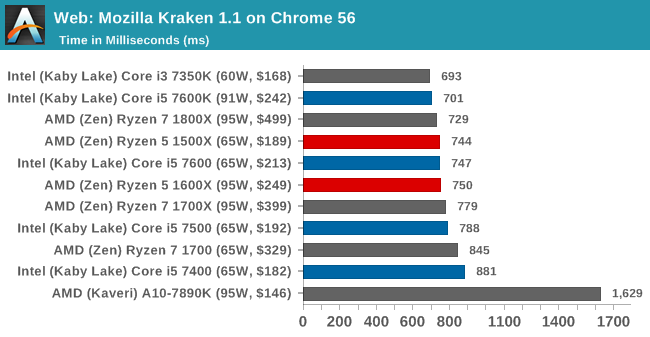
Google Octane 2.0 [link]
Along with Mozilla, as Google is a major browser developer, having peak JS performance is typically a critical asset when comparing against the other OS developers. In the same way that SunSpider is a very early JS benchmark, and Kraken is a bit newer, Octane aims to be more relevant to real workloads, especially in power constrained devices such as smartphones and tablets.
WebXPRT 2013 and 2015 [link]
While the previous three benchmarks do calculations in the background and represent a score, WebXPRT is designed to be a better interpretation of visual workloads that a professional user might have, such as browser based applications, graphing, image editing, sort/analysis, scientific analysis and financial tools. Web2013 is the older tool, superceded by Web2015, however both still are highly relevant for high-performance web applications today.
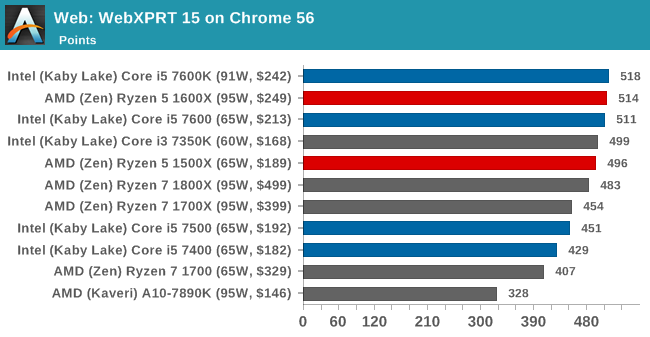


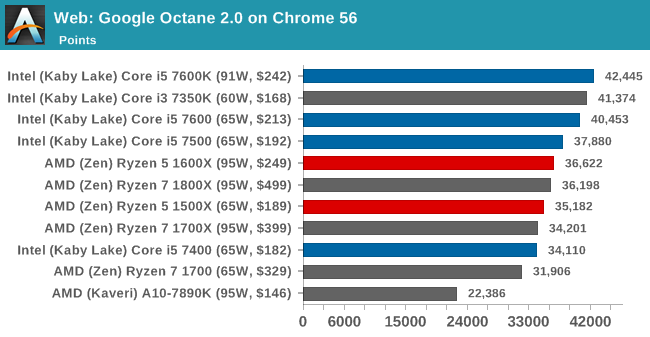
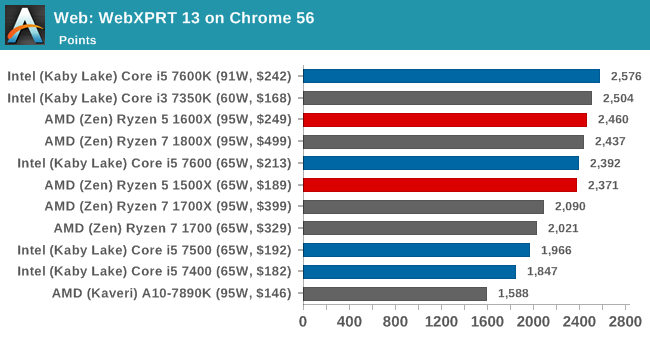








254 Comments
View All Comments
Meteor2 - Wednesday, April 12, 2017 - link
You're quite right. The R7 was a bit 'meh'. It loses a bit too much against the much-higher-clocked i7s. The R5, however, really stands out with better 99th percentile performance and better potential for more to come. (Contary to popular belief, i5s are clocked slower, not faster, than i7s.)Cooe - Monday, March 1, 2021 - link
And yet it was YOU screaming from the roof tops before it came out about just how shit it was going to be... -_-mat9v - Tuesday, April 11, 2017 - link
But then those old games will happily run over 200fps even on Ryzen. Would you care to comment?Can you actually feel the difference in how they work or you are just having a number orgasm?
Reflex - Tuesday, April 11, 2017 - link
Not really sure why I should care about how Ryzen performs in games that are several years old and that even budget CPU/GPU combinations can run more than adequately.cheshirster - Wednesday, April 12, 2017 - link
But Civilisation supports DX12 and it is here in tests with clear win of Zen.MisterJitter - Thursday, April 13, 2017 - link
Now as a precursor I am speculating here, but do you truly believe higher single core frequencies will continue to be the future of CPUs that are already pushing the limits. For example, do you believe Intel's next high end gaming CPU is going to be 6-7GHz? I don't think so... Technology used to increase exponentionally until now. I truly believe that if gaming performance is going to increase at the rate that it has over the past 10 years it's going to be because Devs finally star coding for multiple threads instead of relying on ONE workhorse.FriendlyUser - Tuesday, April 11, 2017 - link
Best CPU ever.eldakka - Thursday, April 13, 2017 - link
IMHO, that crown still belongs to the Celeron 300A. 50% overclockable (450MHz) was standard, and with the right riser card you could enable it for dual-socket systems.In today's terms, it'd be like buying two G4560's (3.5GHz, 2 cores, 4 threads, $63RRP e.a.), overclocking them by 50% on air-cooling (no fancy water) to 5.2GHz, and sticking them in a dual socket motherboard. Giving 4C/8T threads at 5.2GHz for ~$130, compared to an i7-7700K 4C/8T 4.2GHz for ~$340.
jrs77 - Tuesday, April 11, 2017 - link
Singlethreaded the i5 still beats the R5 and the i5 comes with an iGPU which is pretty much mandatory for office PCs and small workstations.Sorry to say, but the AMD R5 is pretty much useless for the majority of users, as the most used software is still singlethreaded (Office, Photoshop, etc).
Let's wait and see what the new AMD APUs will have to offer.
stockolicious - Tuesday, April 11, 2017 - link
"Let's wait and see what the new AMD APUs will have to offer."Its the CPU Ryzen replaces Bulldozer connected to a great iGPU - this is where Intel is going to have a rough time as they don't do top of shelf graphics. When released hard to believe AMD wont have by far the best APU they have made and maybe the best on the market. This might even get them some high end design wins that "Eluded" them during the bulldozer times.